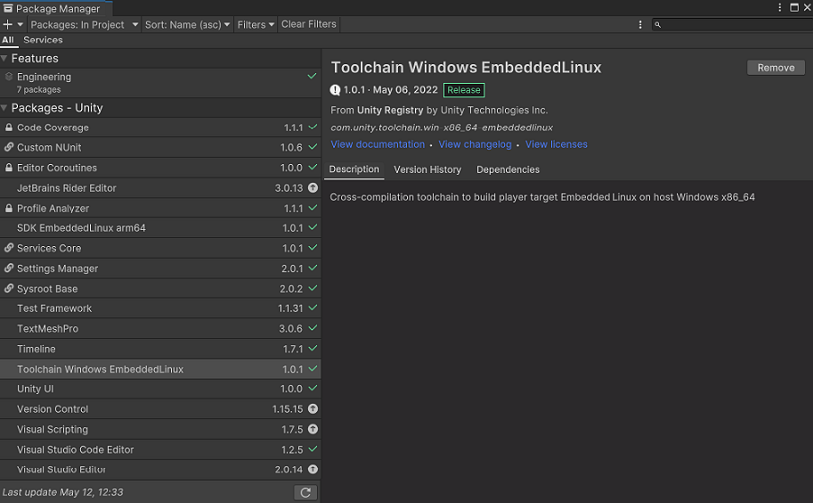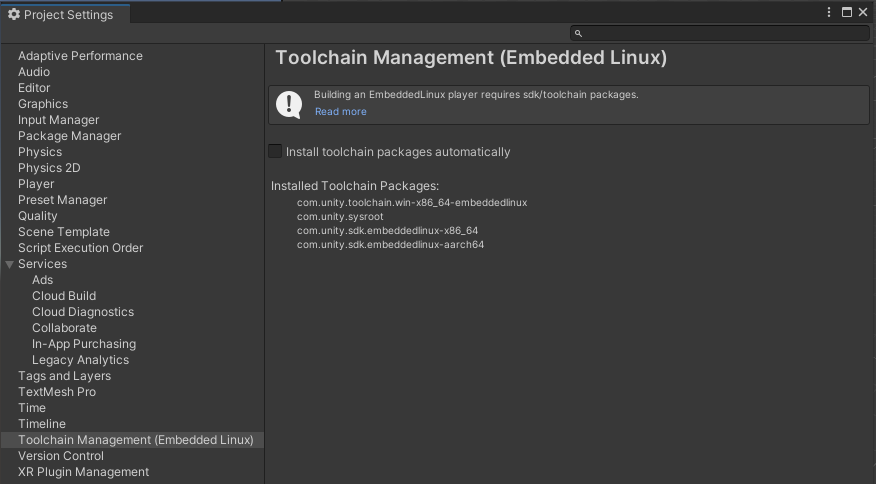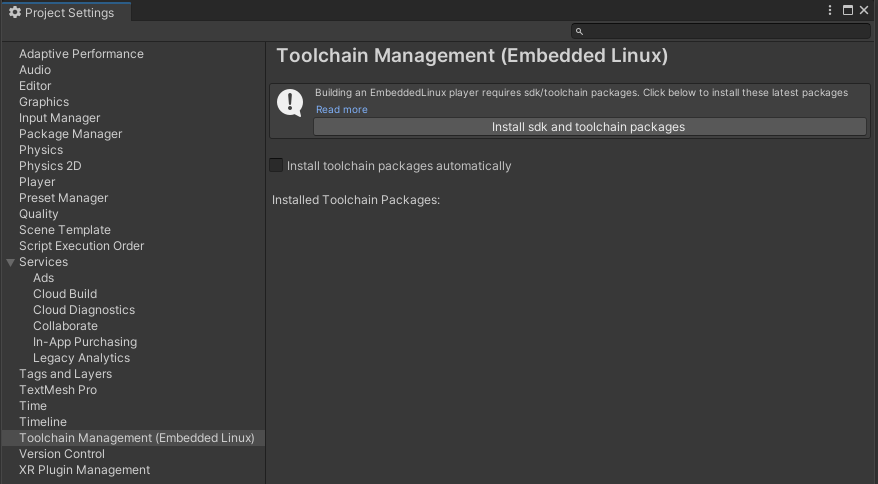Set up your environment for Embedded Linux
Set up your environment to develop with Embedded Linux.
To create a Unity application for Embedded Linux, you first need to set up your Unity project to support Embedded Linux. To support Embedded Linux, a Unity project requires certain packages and dependencies.
Note: You must install the Embedded Linux platform package before you can set up your environment. For more information, refer to Install the platform package for Embedded Linux.
Install the toolchain and SDK packages
After you create a new project with Unity, you must install the following toolchain and SDK packages for your operating system and target architecture. To install a Unity package for Embedded Linux toolchain and SDK, refer to Install a UPM package by name.
Toolchain packages:
| Operating system | Package |
|---|---|
| Windows | com.unity.toolchain.win-x86_64-embeddedlinux |
| MacOS | com.unity.toolchain.macos-x86_64-embeddedlinux |
| Linux | com.unity.toolchain.linux-x86_64-embeddedlinux |
SDK packages:
| Target architecture | Package |
|---|---|
| aarch64 | com.unity.sdk.embeddedlinux-aarch64 |
| x86_64 | com.unity.sdk.embeddedlinux-x86_64 |
| arm32 | com.unity.sdk.embeddedlinux-arm32 |
| x86 | com.unity.sdk.embeddedlinux-x86 |
After you’ve installed the packages, the Package Manager window displays the toolchain and SDK packages that are installed for Embedded Linux.

Automated packages installation
You can also install the required Embedded Linux packages automatically from the Build Settings window.
To initiate the automatic installation of packages:
- Go to File > Build Settings from Unity’s main menu.
- In the Platform list, select Embedded Linux and then click Switch Platform.
- Open the Project Settings window by clicking Edit > Project Settings window.
If the Unity Editor has the Install toolchain packages automatically option enabled by default, then the required packages such as the toolchain and SDKs for installed architectures are installed automatically. After the package installation process is complete, you can check which packages are installed in the Toolchain Management (Embedded Linux) tab in Project SettingsA broad collection of settings which allow you to configure how Physics, Audio, Networking, Graphics, Input and many other areas of your project behave. More info
See in Glossary.

If the option to automatically install packages is disabled, you can switch to the Toolchain Management (Embedded Linux) tab and click Install sdk and toolchain packages.
After you’ve installed the packages, the Package Manager window displays the list of all the toolchain packages that are installed for Embedded Linux.

Dependencies
Embedded Linux must provide direct and indirect dependenciesAn indirect, or transitive dependency occurs when your project requests a package which itself “depends on” another package. For example, if your project depends on the alembic@1.0.7 package which in turn depends on the timeline@1.0.0 package, then your project has an direct dependency on Alembic and an indirect dependency on Timeline. More info
See in Glossary so Unity can run correctly.
Direct dependencies
Direct dependencies load at the application startup.
libm.so.6libgcc_s.so.1libpthread.so.0libc.so.6libdl.so.2librt.so.1
Indirect dependencies
Indirect dependencies load when needed during the application runtime as a shared library.
| Type | Dependencies |
|---|---|
| Audio |
libpulse-simple.so.0 libpulse.so.0 libesd.so.0 libasound.so or libasound.so.2
|
| Wayland |
libwayland-client.so.0 libwayland-egl.so.1 libwayland-cursor.so.0 libxkbcommon.so.0
|
| X11 |
libX11.so.6 libXext.so.6 libXcursor.so.1 libXinerama.so.1 libXi.so.6 libXrandr.so.2 libXss.so.1 libXxf86vm.so.1
|
| OpenGL ES |
libEGL.so.1 libGLESv2.so.2
|
| Vulkan | libvulkan.so.1 |
| Devices | libudev.so.1 |